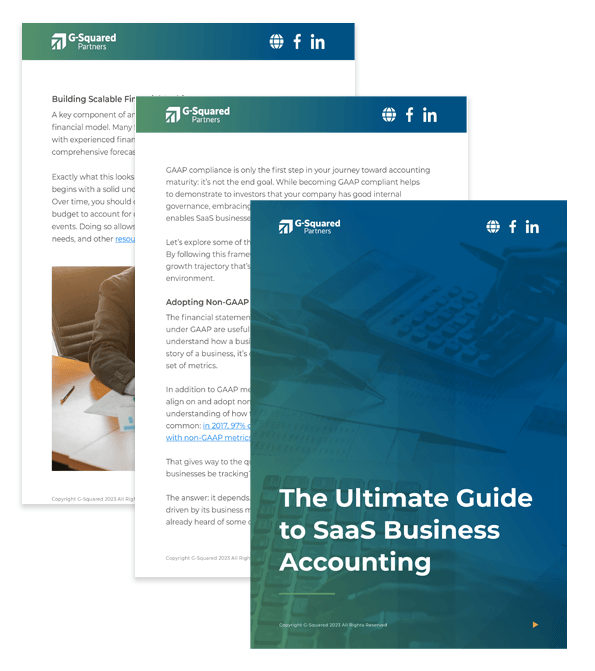
Accountants for Tech Startups
Empowering Your Tech Startup with Expert Financial Guidance: The Role of Specialized Accountants
Contact UsG-Squared Partners specializes in offering comprehensive financial services tailored for tech startups, serving as your dedicated outsourced accounting team or SaaS CFO. We’re ready to pave the way for your startup's success.
What is a Tech Startup Accountant?
A tech startup accountant is more than just a traditional accountant; they are financial experts attuned to the unique needs and dynamics of the tech startup ecosystem. Their role extends beyond basic bookkeeping and financial reporting, delving into areas critical for the growth and scalability of a tech startup. If your startup is in trouble, they can even help with turnaround management.
Typically, a tech startup accountant will have a background in finance or accounting, holding certifications such as CPA (Certified Public Accountant) or CMA (Certified Management Accountant). However, what truly distinguishes them is their specialized experience and ongoing education in the tech sector.

-png.png?width=756&height=395&name=two%20people%20reviewing%20numbers%20on%20a%20calculator%20(1)-png.png)
How do you know it’s time to hire an accountant for your tech startup?
When the financials become too complex: As your startup grows, financial matters become more elaborate. If you're dealing with multiple revenue streams, international transactions, or sophisticated tax scenarios, it's time to hire an accountant.
You don’t have time: If managing your finances takes up too much time that could be better spent on core business activities, it's a clear sign you need an accountant. Outsourcing this task can free up valuable time for you and your team.
You’re preparing for an audit or need help selling your business: If you're preparing for an audit, a sale, or another significant financial event, an accountant can ensure your financial records are accurate and complete.
Your mental health is negatively impacted: If managing your startup's finances is causing stress or uncertainty, hiring an accountant can provide peace of mind, knowing that your finances are in expert hands.
Typically, a tech startup accountant will have a background in finance or accounting, holding certifications such as CPA (Certified Public Accountant) or CMA (Certified Management Accountant). However, what truly distinguishes them is their specialized experience and ongoing education in the tech sector.
What are the most common tech startup accounting services and benefits?
Industry-Specific Knowledge: Tech startup accountants possess a deep understanding of the technology sector, including emerging trends, funding landscapes, and the specific financial challenges tech startups face. This knowledge enables them to provide relevant and strategic financial advice.
Financial Modeling and Forecasting: They are adept at creating sophisticated financial models tailored to tech startups. These models are crucial for forecasting growth, understanding cash flow dynamics, and preparing for funding rounds.
Fundraising and Investment Savvy: Given the importance of securing funding for startups, these accountants have expertise in managing finances in a way that appeals to investors. They understand the nuances of venture capital, private equity, and other funding sources prevalent in the tech industry.
-1.jpg?width=600&height=400&name=3BF_365_32693_3119924456_5%20(1)-1.jpg) Regulatory and Compliance Expertise: Tech startups often navigate complex regulations. A tech startup accountant is well-versed in compliance issues, ensuring that the startup adheres to financial regulations, tax laws, and reporting standards.
Regulatory and Compliance Expertise: Tech startups often navigate complex regulations. A tech startup accountant is well-versed in compliance issues, ensuring that the startup adheres to financial regulations, tax laws, and reporting standards.
Technology Proficiency: They are highly proficient in using advanced accounting software and tools. Their ability to leverage technology for efficient financial management is a key asset, allowing for real-time financial tracking and analysis.
Strategic Business Planning: Beyond managing numbers, these accountants play a pivotal role in strategic planning. They help set financial goals, budget, and align financial strategies with the overall business objectives.
Business Structuring for Tech Startups: The right business structure is crucial for tech startups. It impacts everything from taxation and fundraising to liability and decision-making processes. A tech startup accountant is vital in advising on the most suitable business structure, whether a sole proprietorship, partnership, limited liability company (LLC) or corporation. They help founders understand the implications of each structure and guide them in making an informed decision that aligns with their business goals and growth plans.
Entity Formation and Registration: Setting up a legal entity is critical for tech startups. A tech startup accountant guides founders through entity formation and registration, ensuring compliance with legal requirements. They help select the appropriate entity type, prepare the necessary documentation, and file with the relevant state or federal authorities.
Commercial Banking Infrastructure Management: A tech startup accountant assists in setting up and managing the startup's commercial banking infrastructure. This includes selecting the right bank, opening accounts, and establishing banking relationships that align with the startup's financial needs.
Financial Management and Oversight: They are key in managing the startup's day-to-day financial operations, including cash flow management, transaction monitoring, and financial reporting. The accountant ensures that the banking infrastructure supports efficient financial management and provides the necessary tools for tracking and analyzing financial data.
Integrating Financial Systems: Tech startup accountants help integrate banking systems with accounting software and other financial tools. This integration is essential for automating financial processes, ensuring accuracy in financial reporting, and providing real-time financial insights crucial for decision-making in a fast-paced tech environment.
Scalability and Growth Management: As startups grow, their financial needs become more complex. Tech startup accountants have the skills to build and manage financial systems that scale with the business, ensuring long-term sustainability.
Time and Resource Savings: By outsourcing accounting and finance functions, you and your team can focus on core business activities. An experienced accountant can handle financial tasks more efficiently, thanks to their expertise and familiarity with the latest accounting technologies and practices.
Risk Mitigation: With their expertise, tech startup accountants can identify and advise on mitigating potential financial risks. This includes managing debt, ensuring adequate insurance coverage, and establishing internal controls to prevent fraud and errors.
Increase Investor and Stakeholder Confidence: Having a professional manage your finances can increase the confidence of investors and other stakeholders. It demonstrates a commitment to professionalism and financial transparency, which can be crucial for partnerships, investments, and customer relationships.
G-Squared Partners’ Tech Startup Experience
G-Squared Partners has a rich history of working with a diverse range of tech startups, each with unique financial challenges and opportunities. Understanding the types of businesses we have collaborated with can give you insight into our expertise and how we might assist your startup. Here are some examples:
SaaS (Software as a Service): G-Squared Partners has extensive experience with SaaS companies, which often face unique financial models based on recurring revenue, customer acquisition costs, and long-term customer value. We have helped these companies with cash flow management, forecasting, and strategies for scaling while maintaining a sustainable subscription model.
Biotech: Biotech startups, known for their long product development cycles and heavy R&D investments, require a nuanced approach to financial planning and fundraising. G-Squared has worked with biotech companies and life science firms, assisting them in managing their complex funding requirements, navigating regulatory landscapes, and planning for high research and development costs.
Fintech: In the rapidly evolving fintech sector, G-Squared has provided financial expertise to startups dealing with digital payments, personal finance, and blockchain technologies. Their role often involves strategic planning for rapid growth, compliance with financial regulations, and navigating the competitive landscape of financial technology.
Hardware: Hardware startups, with their manufacturing, inventory, and supply chain complexities, present unique financial challenges. G-Squared has helped these companies with cost analysis, inventory management, and strategies for scaling production while managing the financial risks associated with physical product development.
G-Squared Partners has demonstrated the ability to adapt our financial expertise to the startup's specific needs in each sector. Whether managing a biotech firm's high burn rate, a SaaS company's subscription model, a fintech enterprise's regulatory challenges, or a hardware company's production scaling, G-Squared has provided tailored financial solutions to support growth and success.
Our diverse experience across various tech sectors makes us a valuable partner for tech startups looking for knowledgeable and adaptable financial guidance.
Get Our Ultimate Guide to SaaS Business Accounting
At G-Squared Partners, we’ve provided SaaS accounting services to over 100 SaaS businesses.
Our team has years of experience leading publicly traded SaaS companies and have the skills required to upgrade your financial systems, help you raise investment rounds, and more.
Our Ultimate Guide to SaaS Business Accounting covers all the basic concepts founders and executives need to know to build a solid financial footing equipped to handle scale.

How Much Does a Tech Startup Accountant Cost?
The cost for a tech startup accountant can range hourly from $90 to $300 per hour and $500 to $12,000 for monthly service.
Understanding the cost of hiring an experienced tech startup accountant is crucial for budgeting and financial planning. The cost can vary widely depending on several factors:
Level of Expertise and Experience: More experienced accountants, especially those with a strong background in the tech startup sector, typically command higher fees. Their expertise in navigating the unique financial landscape of startups often justifies the cost.
Scope of Services: The cost is also influenced by the range of services required. Basic bookkeeping services will cost less than comprehensive financial management, which includes strategic planning, fundraising assistance, tax planning, and financial forecasting.
Location: Geographic location plays a significant role in determining cost. Accountants in major tech hubs or metropolitan areas may charge more due to higher demand and living costs.
Billing Structure: Accountants may bill hourly, have a fixed monthly fee, or charge based on specific projects. Hourly rates for experienced accountants can range significantly, while monthly retainers provide more predictability in budgeting.
Size and Complexity of the Startup: The size of your startup and the complexity of its financial needs also impact cost. A larger startup with more complex transactions, multiple funding sources, and international operations will require more intensive accounting services.
Additional Costs: Be aware of additional costs such as software subscriptions, extra services like audit support, or one-time projects like setting up financial systems.
The cost of hiring an experienced tech startup accountant can range from a few hundred to several thousand dollars per month. For startups at an early stage, a part-time or fractional accountant might be a cost-effective solution, providing expert services without the commitment of a full-time salary.
Viewing this cost as an investment in your startup's future is important. A skilled accountant does more than manage books; they provide insights and strategies to save money, identify opportunities, and guide growth, ultimately adding significant value to your business.
A "Go-To Firm for Outsourced CFO Services"
★★★★★
G-Squared Partners is our go-to firm for part-time CFO services. They provide value beyond the classic CFO responsibilities, including participating in strategy sessions, obtaining financing, identifying KPIs and getting significant transactions completed.
Osage Venture Partners

A "True Partner and Extension to Our Team"
★★★★★
G-Squared is more than the outsourced financial services they provide to our organization. They continually work with us to align our strategic vision with the goals of the organization via deep industry expertise; a strong understanding of where markets are trending; and multifaceted experience in diverse industries. On more than one occasion, their forward-leaning guidance, as market conditions evolve, has avoided the pitfalls that have befallen our competitors. Partnership and results-driven outcomes are the cornerstones of our track record together.
David Stefanich, Founder/CEO


Let's Talk Business. Your Business.
Let’s talk about your business and how our services can benefit your company.
Fill out this form and we'll send you information on the service you're interested in.
Interested in working with us? Use the link in your email to set up a time to meet with us to learn if it's a good fit.




-png.png?width=400&name=woman%20presenting%20in%20front%20of%20screen%20with%20graphs%20(1)-png.png)